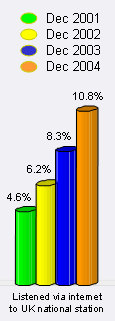This morning RAJAR released their Q4 UK Radio listener figures, over radio, via the Internet and on TV.
For those who don’t follow this kind of thing, RAJAR (Radio Joint Audience Research) is the organisation that monitors and reports the radio listening habits of the UK population, by taking a listening diary of 32,000 people from a pool of 130,000 people around the UK. The figures sound large, and they are. It’s the largest media survey outside the US.
While the details of who is listening to which UK radio station is of great interest to those in that business, the part that caught our attention was the ‘new’ ways of listening to radio, currently via TV-delivery and over the Internet.
 It’s worth clarifying that the Internet figures include any listening of the radio on a computer, whether live streaming, using services like the BBC’s RadioPlayer/Listen Again, or Podcasting (download and play).
It’s worth clarifying that the Internet figures include any listening of the radio on a computer, whether live streaming, using services like the BBC’s RadioPlayer/Listen Again, or Podcasting (download and play).
RAJAR are reporting 16.3% of the UK population, approximately 7.8m people, have used the Internet to listen to radio stations.
 The largest area of growth has been in people listening to UK National radio stations over the Internet. This has increased from 8.3% a year ago to 10.8% of the UK population, equating to just short of 4.8m people. It is thought that this is probably due to an raised awareness that the Internet can be used to listen to the radio, helped in no small part by the BBC pushing the service.
The largest area of growth has been in people listening to UK National radio stations over the Internet. This has increased from 8.3% a year ago to 10.8% of the UK population, equating to just short of 4.8m people. It is thought that this is probably due to an raised awareness that the Internet can be used to listen to the radio, helped in no small part by the BBC pushing the service.
Due to synchronicity or just good planning, it’s of note that a new version of BBC RadioPlayer is released today. Providing very fast access to previously transmitted radio content, it comes with a feature that suggests additional programming that may of interest to the listener, based on the program they have selected to listen to. Once Internet listeners become comfortable with features like this, the number of hours listened to online will be significantly boosted.
Strangely the number of people listening to non-UK stations via the Internet has dropped 1.1% from 4.1% to 3.0%. Quite why this would be the case is a slight mystery.
While listening to the radio through a TV might sound like a very strange idea, it’s becoming increasingly popular and includes delivery over Freeview, Sky and Cable TV. Those with a DVR connected to their Freeview box are also benefiting from being able to record radio programmes and play them back when it suits them.
29.7% of the sample (equating to around 14.25m people) reported that they had, at one time or another listened to the radio through their TV. This is up 8.4% from the same month last year.
RAJAR told us that the people listening via non-traditional means appears to be in addition to their normal radio listening.
As these ‘new’ forms of radio listening are clearly gaining favour with the UK public, we feel there would be significant benefit in gaining a more detailed breakdown in how people are using the Internet to access radio. It would be of benefit to all those involved.
RAJAR are in the process of evaluating new ways to monitor radio usage. They are carrying out trials of electronic ‘listening’ devices that are carried or worn by the user. These would replace the manually completed diary version that’s currently used.
RAJAR
National stations – summary 
London stations – summary 
Detailed figures
New version of the BBC RadioPlayer
 Video streaming specialists, Forbidden Technologies have announced a deal with GMTV to stream the breakfast programme live to its network of field reporters on location across the world.
Video streaming specialists, Forbidden Technologies have announced a deal with GMTV to stream the breakfast programme live to its network of field reporters on location across the world. The technology uses Forbidden’s ground breaking FORscene live compressor, that utilises advanced digital compression techniques to deliver a live video feed to PCs, Macs and laptops via the Web.
The technology uses Forbidden’s ground breaking FORscene live compressor, that utilises advanced digital compression techniques to deliver a live video feed to PCs, Macs and laptops via the Web. Siemens are planning to make a big splash at the upcoming CeBit in Hannover, Germany.
Siemens are planning to make a big splash at the upcoming CeBit in Hannover, Germany. The anticipation around the release of Gran Turismo 4 has been, to put it mildly, huge. Sony are hoping this Playstation2 only game will be their Halo2 type blockbuster.
The anticipation around the release of Gran Turismo 4 has been, to put it mildly, huge. Sony are hoping this Playstation2 only game will be their Halo2 type blockbuster. The European Parliament has voted in favour of a new programme to promote the European digital content market, setting it a budget of €149m (~$194m, ~£103m) for the next three years.
The European Parliament has voted in favour of a new programme to promote the European digital content market, setting it a budget of €149m (~$194m, ~£103m) for the next three years. It’s gradually becoming more common knowledge that the inventor of the Web, and what many people think of as The Internet, is an Englishman.
It’s gradually becoming more common knowledge that the inventor of the Web, and what many people think of as The Internet, is an Englishman. Video Networks Ltd (VNL) has announced that it’s broadband and Video on Demand (VoD) service, HomeChoice, now has 15,000 subscribers, since its relaunch in last September.
Video Networks Ltd (VNL) has announced that it’s broadband and Video on Demand (VoD) service, HomeChoice, now has 15,000 subscribers, since its relaunch in last September. It’s worth clarifying that the Internet figures include any listening of the radio on a computer, whether live streaming, using services like the BBC’s RadioPlayer/Listen Again, or Podcasting (download and play).
It’s worth clarifying that the Internet figures include any listening of the radio on a computer, whether live streaming, using services like the BBC’s RadioPlayer/Listen Again, or Podcasting (download and play). The largest area of growth has been in people listening to UK National radio stations over the Internet. This has increased from 8.3% a year ago to 10.8% of the UK population, equating to just short of 4.8m people. It is thought that this is probably due to an raised awareness that the Internet can be used to listen to the radio, helped in no small part by the BBC pushing the service.
The largest area of growth has been in people listening to UK National radio stations over the Internet. This has increased from 8.3% a year ago to 10.8% of the UK population, equating to just short of 4.8m people. It is thought that this is probably due to an raised awareness that the Internet can be used to listen to the radio, helped in no small part by the BBC pushing the service.
 RealNetworks is enjoying record sales that have helped the Seattle-based Internet company to trim its fourth-quarter loss. The announcement comes amidst its ongoing cost of litigation against rival Microsoft, with whom it’s suing in a billion-dollar case for unfairly promoting its own media software.
RealNetworks is enjoying record sales that have helped the Seattle-based Internet company to trim its fourth-quarter loss. The announcement comes amidst its ongoing cost of litigation against rival Microsoft, with whom it’s suing in a billion-dollar case for unfairly promoting its own media software. Few topics are as hot as mobile music right now, with the Midem Mobile Music Forum the place to be on the subject. Panelists touched upon several important areas, with all attempting to understand the future direction of explosive medium. Once again,
Few topics are as hot as mobile music right now, with the Midem Mobile Music Forum the place to be on the subject. Panelists touched upon several important areas, with all attempting to understand the future direction of explosive medium. Once again,  Napster, one of the largest players in music downloads, is considering offering a film download service. The new service would sit alongside its music offering and help to give the company a competitive edge over its rivals. The technology is already in place to download movies, so the same service model could easily apply to films, television programmes and video games, now that broadband connection speeds are getting faster and more prevalent.
Napster, one of the largest players in music downloads, is considering offering a film download service. The new service would sit alongside its music offering and help to give the company a competitive edge over its rivals. The technology is already in place to download movies, so the same service model could easily apply to films, television programmes and video games, now that broadband connection speeds are getting faster and more prevalent.